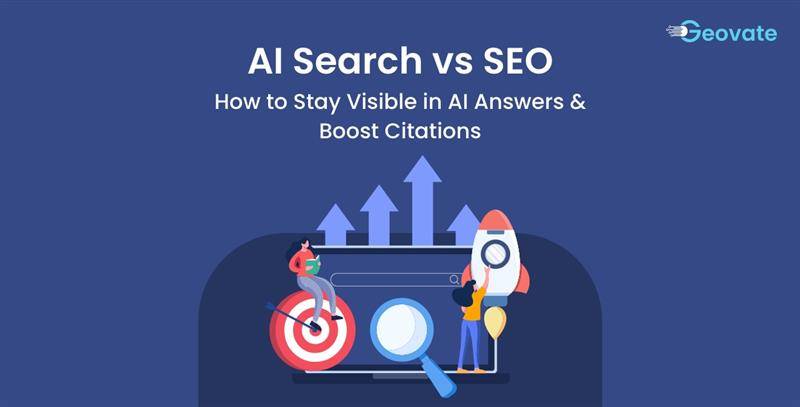AI Search vs SEO: How AI Changes Brand Discovery & How to Stay Visible in 2025
Tue,18 Nov 2025 16:01:00- Font Size
- Share Content

Search is undergoing the biggest shift in history.
For over 20 years, SEO meant ranking in Google’s top 10 blue links. But with AI search tools like ChatGPT Search, Perplexity, Gemini, and Google AI Overviews, users no longer browse through pages—they get direct answers.
Whether your customer is researching a service, comparing tools, or looking for solutions, they may get everything they need without clicking a single website.
This changes everything.
Today:
- Ranking is no longer the main goal.
- Visibility inside AI answers matters more.
- Citations outrank backlinks.
- Structured, expert-led content wins.
This guide breaks down exactly how AI search differs from traditional SEO—and how your brand can stay visible across AI-driven answers.
How Does AI Search Differ from Traditional SEO?
TL;DR
- AI tools give direct answers, reducing clicks—even if you rank #1.
- Citations > rankings. If AI doesn’t cite you, you don’t exist.
- AI prioritizes fresh, structured, expert-written content.
- It prefers long-form question-based queries, not keyword strings.
- AI extracts passages, not entire pages.
- Visibility across YouTube, Reddit, LinkedIn, podcasts, and blogs matters.
- Expertise, authority, and topical depth drive AI visibility.
1. AI Search Reduces Clicks—Even If You Rank #1
Traditional SEO
Ranking #1 meant two things:
✔ You were visible
✔ You got the most clicks
AI Search Today
AI Overviews, ChatGPT Search, and Perplexity answer queries instantly. They often take up the entire screen, pushing organic results far below.
Most users never scroll.
What to Do
To thrive, your content must be AI-extractable:
- Put your primary answer in the first 2–3 sentences.
- Use short paragraphs and bullet points.
- Add FAQ schema and strongly structured answers.
- Prioritize clarity over keyword density.
2. Citations Beat Rankings
In AI search, you can rank on page 1 and still get zero visibility.
Why?
Because AI doesn’t care about rankings—it cares about citations.
What AI Chooses to Cite
- Recently updated pages
- Clear, factual statements
- Articles with real expert authors
- Pages with clean structure and clean markup
- Content with authoritative external mentions
What to Do
- Add bylines, bios, and credentials for authors.
- Update content every 4–6 weeks.
- Start sub-sections with clear, directly answerable sentences.
- Make claims scannable and verifiable.
3. User Intent Replaces Keyword Targeting
Keyword phrases like “best tools” or “SEO guide” are disappearing.
Users now ask AI tools complete, conversational questions:
- “What are the best AI tools for small businesses in 2025?”
- “How will AI change SEO strategies this year?”
These long-form, natural queries require a new content format.
What to Do
- Optimize for questions, not keywords.
- Create H2s and H3s that mirror real user searches.
- Use People Also Ask, Reddit, Quora, and AI tools to identify real questions.
- Write conversational, complete answers.
4. AI Extracts Sections, Not Entire Pages
Google ranks full pages.
AI tools extract passages, also known as “chunks.”
Your goal is to make every section a self-contained answer.
How to Optimise
- Start each section with a bold, factual opening sentence.
- Keep paragraphs under 3–4 lines.
- Use bullet points, lists, and mini-summaries.
- Make each subsection an “answer unit.”
5. Structured Data Matters More Than Ever
AI relies on structured data to understand topics and map content relationships.
Important Schema Types
- Article
- FAQ
- How-To
- Person (for author details)
- Organization
- Breadcrumb
What to Do
- Add FAQ schema to all important blogs.
- Use the How-To schema for processes or guides.
- Include author schema to reinforce expertise.
- Ensure JSON-LD is clean, error-free, and updated.
6. Visibility Across Multiple Platforms Drives AI Citations
AI doesn’t rely only on websites.
It pulls information from:
- YouTube transcripts
- Reddit discussions
- LinkedIn posts
- Podcasts
- Twitter/X
- Industry reports
- Blogs and news articles
Your website is no longer your only ranking surface.
What to Do
- Repurpose each blog into short explainer videos.
- Publish 3–4 LinkedIn posts summarizing the blog.
- Share micro-summaries on Reddit communities.
- Create Instagram carousel posts, shorts, and infographics.
Brands that show up everywhere get cited everywhere.
7. AI Rewards Expertise, Not Generic Content
Generic SEO content will disappear from AI results.
AI prefers content written by real experts with:
- First-hand experience
- Case studies
- Data-backed insights
- Clean sourcing
- Author transparency
What to Do
- Add expert quotes or internal insights.
- Include data, statistics, or charts.
- Highlight certifications, experience, or credentials.
- Build your authors’ public profiles across platforms.
Win AI Search with Geovate
As AI search becomes the primary mode of discovery, brands need more than traditional SEO—they need complete AI visibility. This is where Geovate gives businesses a competitive edge.
Geovate helps brands become fully “AI-search-ready” by ensuring that their content is structured, credible, multi-platform, and frequently updated so AI tools want to cite them.
How Geovate Helps You Dominate AI Search
✔ AI-Optimised Content Structure
Geovate formats your content to make it easily extractable by AI models—improving citation likelihood across ChatGPT Search, Perplexity, and Gemini.
✔ Citation-Ready Content
By enhancing clarity, factual accuracy, and expert-backed statements, Geovate increases your chance of appearing in AI answers.
✔ Multi-Platform Visibility
AI models pull from many sources—not just websites.
Geovate boosts your presence across:
- YouTube
- Social platforms
- Industry listings and directories
✔ Real-Time AI Visibility Insights
Know exactly when and where your brand appears in AI answers—and where it doesn’t.
✔ Expertise & Authority Signals
Geovate strengthens author credibility with:
- Author schema
- Verified profiles
- Expertise tags
- Freshly published and update indicators
Why Geovate Matters Now
AI search rewards brands that are:
- Fresh
- Verified
- Structured
- Multi-platform
- Expert-led
- Frequently updated
Geovate enables all of this—helping your brand stay visible in the AI era where answers matter more than rankings.
How to Adapt to the AI Search Landscape
If you want lasting visibility, adopt these seven essential strategies:
1. Lead With the Answer
Start every section with the conclusion, not the explanation.
2. Write for Questions, Not Keywords
Use natural, conversational headings that reflect real queries.
3. Apply Structured Data Across Pages
Help AI find, extract, and understand your content.
4. Refresh Content Every 4–8 Weeks
Freshness is now a ranking factor for AI.
5. Build Deep Content Hubs
Clustered content boosts topical authority.
6. Be Everywhere
Publish across multiple platforms to increase citations.
7. Track AI Citations Regularly
Check ChatGPT Search, Perplexity, and Google AI Overviews to understand your visibility footprint.
Conclusion
AI search is not killing SEO—it’s transforming it into something bigger.
To win in 2025 and beyond, brands must optimize for:
- Citations, not just rankings
- Structured, extractable content
- Author authority and expertise
- Fresh updates
- Cross-platform visibility
- Natural, question-based queries
Businesses that adapt will dominate AI-generated answers. Those that don’t may vanish from the customer journey entirely.
Frequently Asked Questions
Q1. What is the difference between AI Search and traditional SEO?
AI search provides direct answers and citations, whereas traditional SEO ranks web pages. AI tools extract specific passages, not full pages, and rely on structured, expert-led content.
Q2. How do I get my website cited in AI-generated answers?
Update content frequently, add expert credentials, use structured data, and write clear, factual statements. AI cites sources that are fresh, authoritative, and easy to extract from.
Q3. What type of content does AI search prefer?
AI prefers structured, concise, expert-written content with clear answers, bullet points, and updated information. Long-form question-based content performs best.
Q4. Does keyword density still matter for SEO?
Not anymore. AI prioritizes user intent, natural language queries, and structured answers—not keyword stuffing.
Q5. How can I optimize content for AI Overviews?
Lead with the answer, use short paragraphs, add FAQ schema, incorporate statistics, and make each section self-contained.
